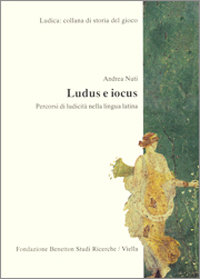
Ludus e iocus
Percorsi di ludicità nella lingua latina
[Ludus and iocus. Aspects of ludicity in the Latin language]
by Andrea Nuti
Fondazione Benetton Studi Ricerche-Viella
Treviso-Rome 1998
232 pages
21,69 euros
ISBN 88-85669-67-0
(Ludica, 4)
This work exploits the fact that the changes in attitude and behaviour towards games between Ancient and Imperial Rome were extensively reflected in language. Textual analysis of early, classical and late Latin documents shows how leisure activities were experienced at individual and collective levels for almost a millennium; and linguistic analysis of the semantic-lexical type proposed by late Wittgenstein provides the framework for a study that traces the use and disappearance of the term ludus. This history of the Latin words associated with games gives an entirely new and evealing insight into the vision and culture of ludus.
Contents
Introduzione, p. 9
1. Ludus in età arcaica, p. 15: 1.1. Ludi “giochi pubblici”, “spettacoli” e beffe plautine, p. 16; 1.2. Ludus al singolare: un singolo “spettacolo”, p. 22; 1.3. Ludus al singolare: i multiformi aspetti del ludus in Plauto, p. 24; 1.4. Terenzio, Eunuchus 587: ludum ludere, p. 29; 1.5. Ludus in ambito erotico, p. 31; 1.6. Ludus nell’ambito dell’apprendimento, p. 32; 1.7. Il verbo ludo, p. 34; 1.8. Un composto verbale: eludo, p. 41
2. Iocus in età arcaica, p. 47: 2.1. Iocus con verba dicendi, p. 47; 2.2. Iocus: “scherzo verbale”, p. 49; 2.3. Iocus vs. serius, p. 49; 2.4. Il verbo iocor, p. 54
3. Tre casi di accostamento sintagmatico fra ludus e iocus, p. 57: 3.1. “Per ioculum et ludum” e il mondo dei saltimbanchi in Plauto, p. 57; 3.2. Ludus iocus: cumulatio in asindeto, p. 61; 3.3. Ludum et iocum esse: ‘un gioco da ragazzi’, p. 64
4. Un’analisi semantica di ludus e iocus in età arcaica, p. 67
5. Ludus e mimesi, p. 83: 5.1. ‘Apprendimento’, ‘scuola’, p. 83; 5.2. ‘Esercizio’, p. 86; 5.3. Fictio, p. 89; 5.4. Mimesi, p. 94
6. Ludus e produzione letteraria, p. 103: 6.1. Ludus poetico, p. 103; 6.2. Iocus et vinum in Catullo, p. 108; 6.3. Ludere e ioci poetici, p. 109; 6.4. Una nuova contrapposizione: ludus vs. serius, p. 115
7. Ludus ed Eros, p. 119: 7.1. Eros come ludus, p. 119; 7.2. Eros come iocus, p. 125
8. Ludus e lusus, p. 133
9. Ovidio e gli ioci di società, p. 147
10. Ludus iocans e iocus ludens, p. 157
11. Il gioco della Sorte, p. 177
12. Conclusioni, p. 185: 12.1. Per speculum ludi, p. 185; 12.2. Ludus e iocus tra dinamicità e staticità lessicale, p. 196
Appendice bibliografica: Edizioni dei testi latini, p. 213; Concordanze e lessici utilizzati, p. 216; Passi degli autori citati, p. 219
Indice dei nomi e delle cose notevoli, p. 225
